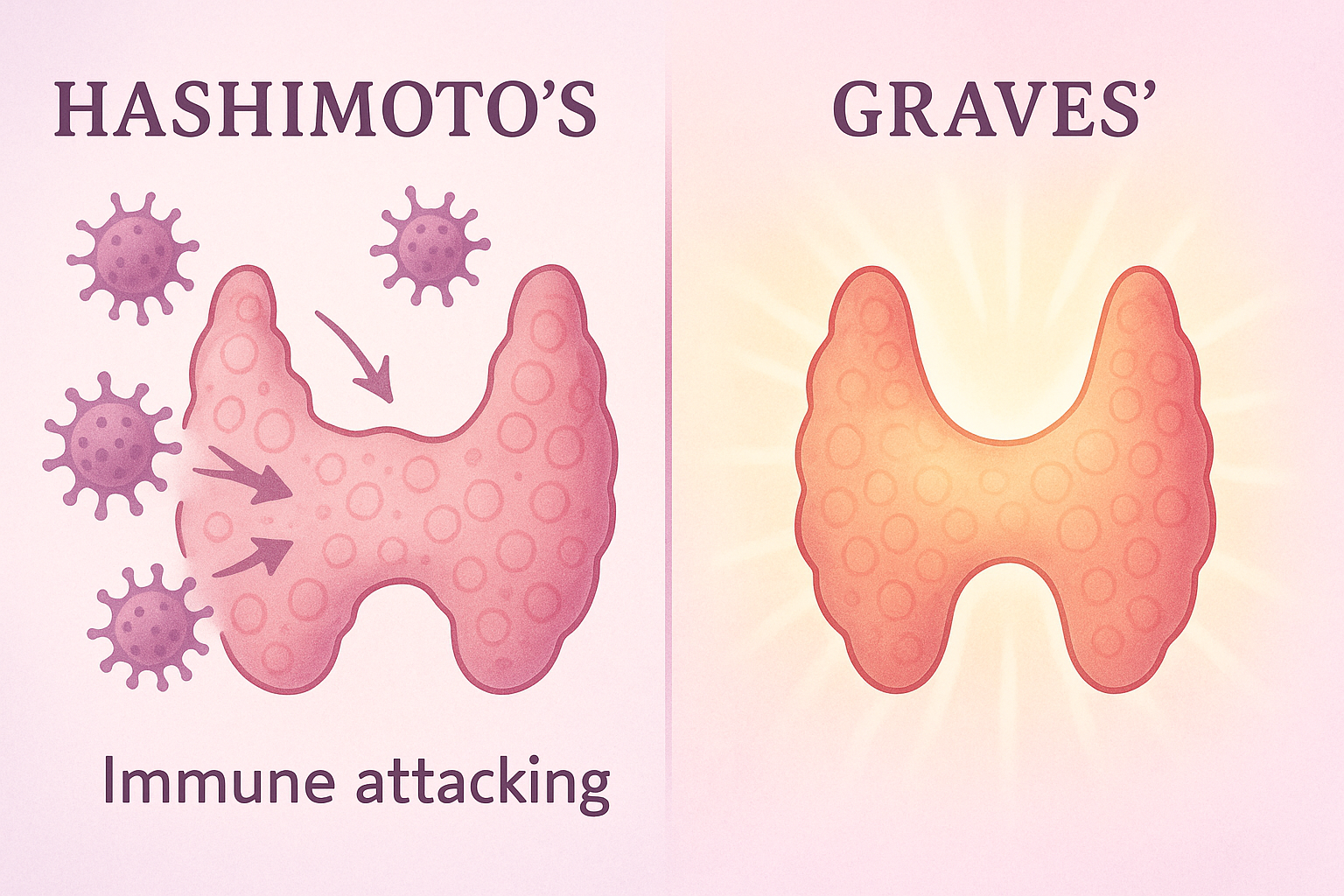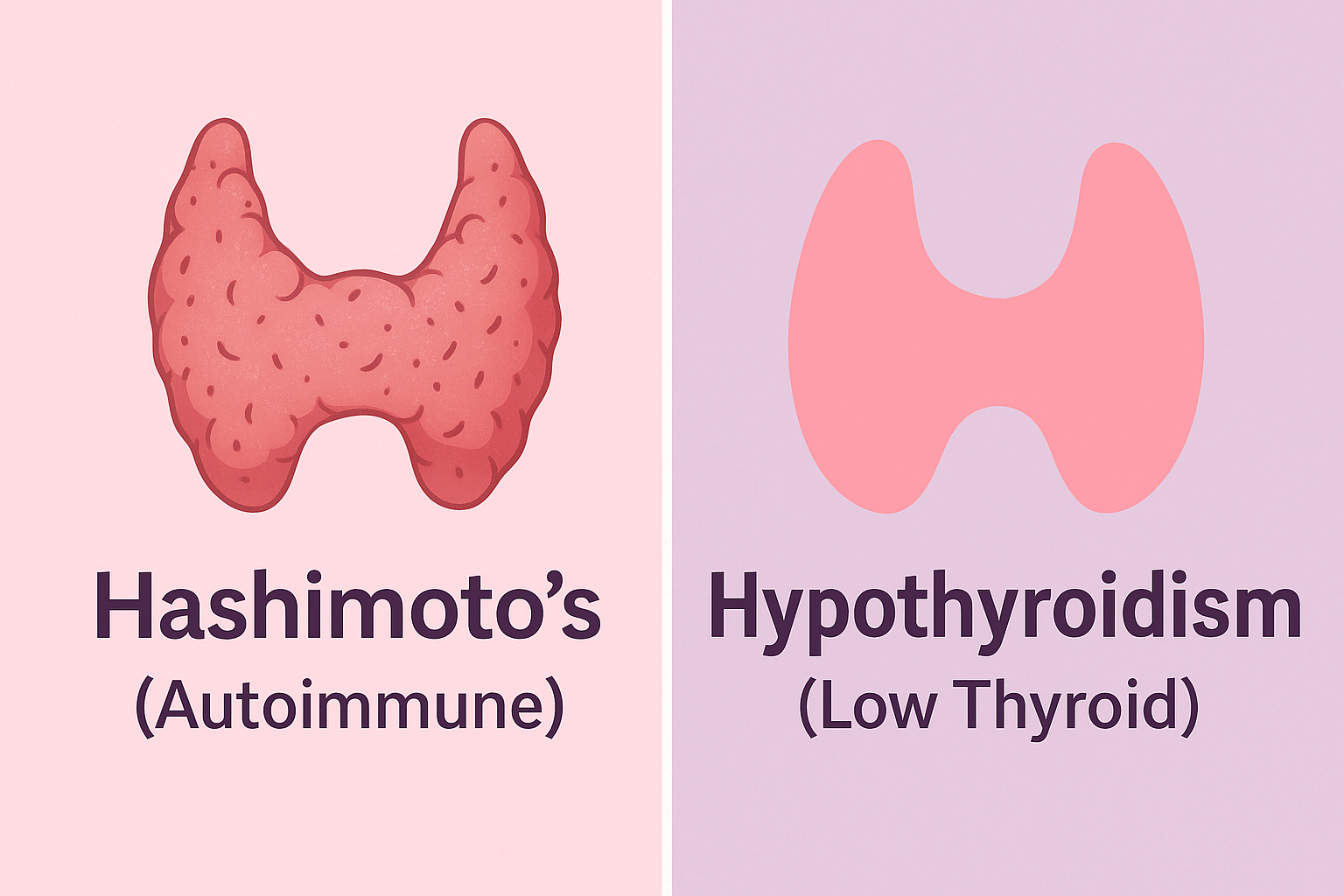If you’ve been feeling exhausted no matter how much you sleep, rely on caffeine to get through the day, or struggle with stubborn weight gain and brain fog — it might not be “just stress.”
Your symptoms could signal an imbalance between your thyroid and adrenal glands — two key players in your body’s energy system.
When these glands are out of sync, you enter a cycle of hormonal burnout known as adrenal fatigue, which can suppress thyroid function and leave you feeling drained.
Let’s explore how thyroid and adrenal health are connected — and how you can naturally restore your energy, metabolism, and vitality.
🔗 The Thyroid–Adrenal Connection
Your thyroid and adrenal glands work like partners in a relay race — constantly exchanging hormonal signals that regulate metabolism, stress response, and energy.
- The thyroid gland controls your metabolism, energy, and body temperature through hormones T3 and T4.
- The adrenal glands produce cortisol, your main stress hormone, which helps you handle physical and emotional stress.
When chronic stress pushes cortisol levels too high (or too low), it disrupts how your thyroid hormones are produced, converted, and used.
🧠 Related: The Connection Between Estrogen Dominance and Thyroid Issues
⚠️ How Adrenal Fatigue Suppresses Thyroid Function
1. High Cortisol Blocks Thyroid Hormone Conversion
Cortisol interferes with the enzyme that converts T4 (inactive hormone) to T3 (active hormone) — slowing metabolism and energy.
2. Cortisol Increases Reverse T3 (rT3)
Instead of producing active T3, the body produces reverse T3, an inactive form that blocks thyroid receptors and causes fatigue.
3. Stress Alters TSH (Thyroid-Stimulating Hormone)
Chronic stress can cause erratic TSH levels, leading to misdiagnosis or missed thyroid problems.
4. Adrenal Dysfunction Impairs Blood Sugar and Insulin Balance
Unstable blood sugar makes you crave carbs and caffeine — which spike cortisol even higher and further drain your adrenals.
🔄 The “Adrenal–Thyroid Burnout Cycle”
Here’s how the cycle usually unfolds:
- Stress hits. You produce cortisol to cope.
- Chronic stress keeps cortisol elevated.
- High cortisol suppresses thyroid hormone conversion.
- Low thyroid output slows metabolism, digestion, and detox.
- You feel fatigued → reach for sugar or caffeine → more cortisol.
Without intervention, this cycle leads to persistent exhaustion, hormone imbalance, and thyroid resistance.
🩺 Signs of Combined Thyroid and Adrenal Fatigue
| Category | Common Symptoms |
|---|---|
| Energy | Morning fatigue, mid-afternoon crash, low stamina |
| Mood | Anxiety, irritability, emotional sensitivity |
| Body | Weight gain (especially belly fat), cold hands/feet, low libido |
| Sleep | Trouble falling or staying asleep, unrefreshed mornings |
| Digestive | Cravings for salt or sugar, bloating, constipation |
If you have both thyroid and adrenal symptoms, treating one system alone rarely works — they need to be balanced together.
🧪 Testing for Thyroid and Adrenal Function
Ask your practitioner for a comprehensive panel, including:
- TSH, Free T4, Free T3, Reverse T3
- Thyroid antibodies (TPOAb, TGAb)
- Cortisol (saliva or urine, multiple times per day)
- DHEA, a hormone that buffers stress effects
A “normal” lab result doesn’t always mean optimal — your provider should interpret them in context with symptoms.
🌱 Natural Strategies to Rebalance Thyroid and Adrenal Health
1. Reset Your Sleep–Wake Rhythm
- Go to bed before 10:30 p.m.
- Avoid screens 1 hour before sleep.
- Get 10–15 minutes of morning sunlight to reset cortisol rhythm.
2. Stabilize Blood Sugar
- Eat balanced meals: protein + fiber + healthy fat.
- Avoid skipping breakfast.
- Limit caffeine and refined carbs, which spike cortisol.
3. Support Nutrient Deficiencies
Both glands rely on key nutrients:
- Magnesium – relaxes the nervous system
- Vitamin C – reduces cortisol
- Zinc and Selenium – boost thyroid hormone conversion
- B Vitamins – support adrenal recovery
Learn more: 10 Essential Vitamins and Minerals for a Healthy Thyroid
4. Incorporate Adaptogenic Herbs
Adaptogens gently restore balance to both thyroid and adrenal function.
Top options include:
- Ashwagandha – boosts thyroid activity and reduces stress
- Rhodiola Rosea – improves mood and endurance
- Holy Basil (Tulsi) – regulates cortisol levels
- Licorice root – prolongs cortisol’s half-life (best for low cortisol types)
Always consult a healthcare provider before combining herbs with medication.
5. Support the Liver
The liver converts thyroid hormones and clears cortisol byproducts.
Eat cruciferous vegetables, stay hydrated, and avoid alcohol or chemical-laden beauty products.
See: Foods That Harm Thyroid Health (and What to Avoid)
6. Gentle Exercise (Not Overtraining)
Too much cardio can spike cortisol.
Choose walking, yoga, Pilates, or resistance training 3–5 times weekly to support metabolism without stressing the adrenals.
Check out: Exercise Tips for Balancing Thyroid Hormones
🧘 Stress-Relief Habits That Heal Both Glands
- Practice deep breathing or meditation 10 minutes daily
- Try contrast showers (warm/cool) to stimulate circulation
- Keep a gratitude journal to shift your nervous system from “fight-or-flight” to “rest-and-repair”
🌸 When to Seek Professional Help
If your fatigue, anxiety, or hormonal issues persist despite lifestyle changes, it’s worth consulting a functional medicine or integrative practitioner.
They can personalize nutrition, adaptogens, and thyroid support — sometimes using low-dose medication temporarily while your body recovers.
🌺 Final Thoughts
Your thyroid and adrenal glands are deeply interconnected — both are essential for balanced hormones, metabolism, and stress resilience.
You can heal them naturally by reducing stress, supporting nutrient levels, improving sleep, and eating for steady energy.
When you nurture these glands together, you restore your body’s natural rhythm — and the vitality that stress once stole.
Restore Energy and Hormonal Balance Naturally
Discover gentle, evidence-based supplements that support both adrenal resilience and thyroid function — safely and effectively.
Find Your Best Thyroid Support →❓ FAQs
- What is the link between the thyroid and adrenal glands?
Both control metabolism and stress response. Chronic stress elevates cortisol, which suppresses thyroid hormone activity. - Can adrenal fatigue cause thyroid problems?
Yes. Prolonged cortisol imbalance disrupts thyroid hormone conversion and cellular sensitivity. - How do I know if I have adrenal fatigue?
Look for fatigue, cravings, sleep disturbances, anxiety, and low motivation. Saliva cortisol tests confirm it. - Can you have both thyroid and adrenal issues?
Absolutely — many women experience both together, especially after prolonged stress or hormonal changes. - What nutrients help heal thyroid and adrenal function?
Magnesium, vitamin C, B vitamins, zinc, selenium, and adaptogenic herbs like ashwagandha. - Does caffeine make adrenal fatigue worse?
Yes. It spikes cortisol and drains your adrenals over time, worsening fatigue. - Which adaptogens are best for adrenal recovery?
Ashwagandha, rhodiola, holy basil, and licorice root help rebalance cortisol and thyroid hormones. - Can exercise help adrenal fatigue?
Yes — but gentle forms like walking or yoga are best. Overtraining raises cortisol. - How long does recovery take?
Most people feel better within 6–12 weeks of consistent rest, nutrition, and stress management. - Should I take thyroid medication if I have adrenal fatigue?
Only under a doctor’s guidance. Adrenal repair should accompany thyroid therapy for optimal results.
🔗 Related Articles
- The Connection Between Estrogen Dominance and Thyroid Issues
- Postpartum Thyroid Changes: What Every Woman Should Know
- How Birth Control Pills Affect Thyroid Hormones
- How to Choose the Right Thyroid Supplement for You
Restore Your Natural Energy Balance
Thyrafemme provides comprehensive support for both thyroid function and adrenal health, helping break the cycle of fatigue and restore your body’s natural energy production.
- Contains adaptogens that help regulate cortisol and support adrenal function
- Provides nutrients essential for thyroid hormone production and conversion
- Supports energy metabolism without relying on stimulants or caffeine











